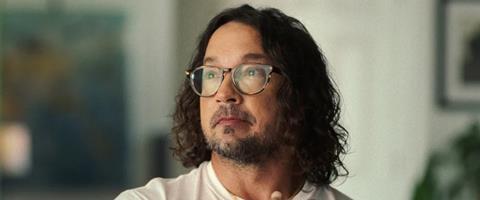The latest TV docuseries to scrutinise Hillsong’s failings is the most thorough and fairest yet. As Carl Lentz gives his first interview since being fired from the megachurch, Sam Hailes argues that we can’t blame the media for wanting to shine a light on abuse and moral failings in the Church. It’s time to learn the lessons

Ten years ago, if one had to guess whether Hillsong would be exposed for abuses of money, sex or power (the famous three temptations which have shipwrecked many ministries) you’d pick money every time. At least I would have done.
I’ve visited Hillsong London on numerous occasions, and can remember being enamoured with it. By all accounts, my local evangelical church had decent resources, (‘resources’ being Christianese for ‘wealth’) but Hillsong took this to another level. Everything screamed big budget - from the hiring of a top theatre in London’s West End, to the quality of the music. Every perfectly crafted service featured a mini sermon on tithing and it wasn’t unusual to hear prosperity gospel-tainted messages from the front. Oh well, I thought to myself. You don’t go to Hillsong for the message, you go for the music.
Now of course, people don’t go for either. Attendance has plummeted and tithing is down 20 per cent according to some reports. In the past few years Hillsong Church has faced scandal after scandal. The four-part docuseries The Secrets of Hillsong gives you a front row seat to the drama. Not that any Christian should watch this for entertainment. Granted, it’s an engaging, well-told story that hooks you in. But as Proverbs warns: “Do not gloat when your enemy falls; when they stumble, do not let your heart rejoice” (24:17).
Lentz reveals he was sexually abused as a child and told to keep it quiet. This led to a pattern of addiction and secretive behaviour
When approaching documentaries which paint Christians and churches in a negative light, it’s easy to bemoan the mainstream media’s obsession with bad news. Sure, Hillsong got some stuff wrong, but what about the thousands who had a positive experience? we Christians argue. Why doesn’t the press ever report on revivals, healings and miracles? They’re only interested in bad news about the Church.
The problem with this narrative is that Hillsong’s issues were so widespread, and it’s sins so damaging, that bemoaning - even in a general sense - the media’s tendency to stick it to evangelicals is in very poor taste. After all, if Christians hadn’t behaved horrendously in the first place, this documentary could never have been made. Hillsong can’t blame the media, they can only blame themselves.
A documentary like this allows the voices of victims to be heard, in some cases for the first time. Now is not the time for defensiveness. It’s time to listen and learn the lessons, because the lessons are legion.
The fall of Carl Lentz
Given my assumption that if Hillsong were to ever face negative publicity it would be over money, it’s notable that in this four part series - which constitutes both the most thorough and the fairest expose of Hillsong yet (see past efforts from the BBC and Discovery Plus) - barely any time is given to the issue of finance. There are serious allegations of outrageous behaviour in this area; travelling pastors earning $20,000 per sermon. An Australian politician memorably pronouncing that Hillsong’s former senior pastor, Brian Houston, “treated private jets like Ubers” and went on shopping sprees “that would embarrass a Kardashian”. But the non-financial allegations are worse. Far worse.
Carl Lentz is the centrepiece of this series. The golden boy protege was tasked with planting and growing Hillsong’s New York City congregation. He called it “church in the wild” as thousands gathered to worship Jesus in an underground nightclub. He was Justin Bieber’s pastor and an in-demand and gifted preacher who looked more like a model than a church leader.
“Church is very triggering for me right now. I still can’t sing,” Laura Lentz says through tears
The Secrets of Hillsong contains Lentz’s first and only on-camera interview since he was fired from Hillsong after cheating on his wife. He owns up to his sins and seems repentant. “I failed miserably” he says. “I should have called someone and said I have disqualified myself from ministry.”
“I let down a lot of good people. I can only apologise and change,” he says later. “It’s a pretty humbling road to be on every day.”
For those looking for an explanation as to why Lentz broke his marriage vows (this reviewer wasn’t), he tells us: “My actions are my fault. What I’ve done is my fault. But where this thing started I had no control over. I was a kid.” After that, Lentz reveals he was sexually abused as a child and told to keep it quiet. This led to a pattern of addiction and secretive behaviour, he says, including the affair.
Commentators will quibble over Lentz’s words here, but my issue is less what he says on camera, and more why the cameras were present at all. Why did this couple invite television cameras in to film their family’s dinner table conversations? Why did Lentz volunteer traumatic details about one of his children’s serious mental health problems? Did we really need to see the couple’s teenagers talking about how Carl’s affair affected their own faith? Is nothing private anymore?
One of the loudest lessons from this film is that Christian celebrity culture needs to die, but by opening themselves up to do an Oprah-style tell all interview, Carl and Laura Lentz seem - unwittingly perhaps - to be enhancing it. One of the accusations made is that during his ministry, Lentz was too busy writing books, travelling and being chaplain to the New York Knicks basketball team. All that chasing after glitz, glamour and fame meant he wasn’t where he was supposed to be; either at home or, secondarily, doing the unglamourous hard work of a pastor, caring for his flock.
Lentz is undoubtedly someone who likes the camera to be on him. But hopefully his fall from grace is helping him learn that such a trait can be destructive. (Brian Houston put it more bluntly when he accused Lentz of “narcissistic behaviour.”)
The docuseries paints a picture of the Lentzs as a family who are in a much healthier place now, albeit still going through a process of healing. Laura Lentz bravely confesses that she finds church a struggle. “Church is very triggering for me right now. I still can’t sing,” she says through tears. And your heart goes out to her. But what’s best for this couple? Not another journalist giving their opinion on their marriage, that’s for sure. Perhaps a few more years of obscurity, far away from the bright lights of a megachurch (or the glare of a TV camera). A period of time where they’re not known by the masses, but by a largely nameless, faceless church community. It won’t be glamourous, but it will be healthy.
Victims
Laura Lentz is far from the only victim. As a gay man, Hillsong’s former choir director Josh Canfield was attracted to the church’s “come as you are” slogan. He was serving in a prominent position with no difficulties until public statements from Brian Houston articulating a traditional view of sexual ethics resulted in Canfield being asked to stand down. His story is important because it’s not unique to Hillsong. Many churches fail to provide clarity in this area, and a conspiracy of silence damages everyone.
Furthermore, it’s clear that a lack of depth of teaching and theology can have serious pastoral consequences. As Hillsong discovered to their detriment, you can’t disciple people with slogans. “Come as you are” isn’t good enough. More explanation is needed.
Hillsong can’t blame the media, they can only blame themselves
The documentary suggests that Hillsong put too heavy an emphasis on leaders being appointed by God and the need to respect them. This made it impossible for survivors to come forward or be believed. The culture was weighted entirely toward “God’s anointed”. They held all the power, and accountability was minimal.
As safeguarding crises and scandals continue to hit the headlines, church leaders must look again at their own accountability structures. As Marcus Honeysett put it so well in his blog, leaders need to ask themselves “what safeguards would be strong enough to protect me and everyone else from the worst version of me?”
The final episode of the series, the focus shifts back to the church’s founder, Brian Houston, who is currently facing charges of concealing the child abuse committed by his late father, Frank Houston. If found guilty, Brian could face years in prison. He denies all wrongdoing and has vowed to clear his name. In the meantime, as the documentary explains, his supporters have written off the allegations as evidence of “spiritual attack”. Wiser heads would surely wait for the judge’s verdict, before throwing around such claims?
Aside from the criminal charges, there are other allegations regarding Houston. These involve women, keys to hotel rooms and $25,000 of hush money already allegedly paid out. Houston again denies much of this, but it’s notable he is no longer senior pastor of the church he founded, having resigned in 2022 after an internal investigation found he behaved inappropriately toward two women. None of this has stopped him touring the world and speaking at other churches, in what one commentator called a “non-apology tour”.
The model “works”
The Hillsong story is not over yet. A megachurch which employs hundreds of people, gathers thousands to stadium-sized events and sells millions of records was never going to disappear overnight. But the damning truth is that there was such widespread failure in this institution that a documentary maker can produce 250 minutes of footage, and the vast majority of the allegations hold up to scrutiny.
The only redeeming factor we can cling to is that, by bringing the truth to light, progress can perhaps now be made. But only if we are willing to learn the hard lessons - lessons which apply to many churches, not just Hillsong.
Hillsong created a model for leaders to convert their charisma into success. As one participant remarks of Lentz: “his primary gift was charm.” That charm helped feed the Hillsong machine. It was harnessed - and it resulted in what everyone in Christendom wants - a growing church! Who dares question the means when the ends look so great?
Except now, we know we must do exactly that if the Church is to learn anything at all.

The Secrets of Hillsong is streaming now on Disney+





































No comments yet